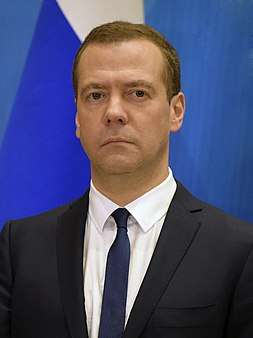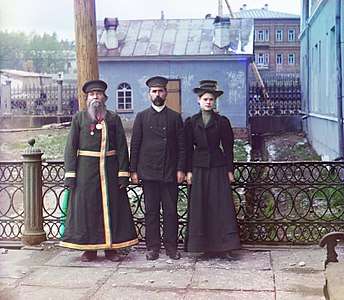List of presidents of Russia
This is a list of presidents of the Russian Federation, a country that was formed in 1991 after the fall of the Soviet Union. This list includes only those persons who were sworn into office as President of Russia following the ratification of the Russian Constitution, which took effect in 1993. For a longer, but less detailed list, go to List of heads of state of Russia.
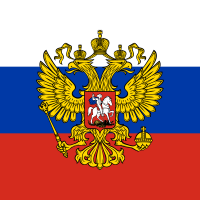
History
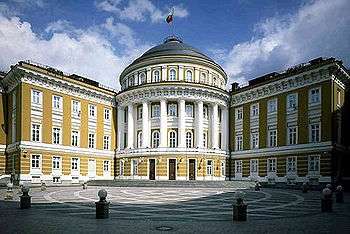
Boris Yeltsin came to power with a wave of high expectations. On 12 June 1991 he was elected president of the Russian Soviet Federative Socialist Republic with 57% of the vote, becoming the first popularly elected president.[1] But Yeltsin never recovered his popularity after a series of economic and political crises in Russia in the 1990s. The Yeltsin era was marked by widespread corruption, economic collapse, and enormous political and social problems.[1] By the time he left office, Yeltsin had an approval rating of two percent by some estimates.[1]
Throughout his presidential terms and into his second term as the Prime Minister, Putin has enjoyed high approval ratings amongst the Russian public. During his eight years in office, the economy bounced back from crisis, seeing GDP increase sixfold (72% in PPP),[2] poverty cut more than half[3] and average monthly salaries increase from $80 to $640, or by 150% in real rates.[4] At the same time, his conduct in office has been questioned by domestic dissenters, as well as foreign governments and human rights organizations, for his handling of internal conflicts in Chechnya and Dagestan, his record on internal human rights and freedoms, his relations with former Soviet Republics, and his relations with the so-called oligarchs: Russian businessmen with a high degree of power and influence within both the Russian Government and economy. This was seen by the Kremlin as a series of anti-Russian propaganda attacks orchestrated by western opponents and exiled oligarchs.[5]
Medvedev was appointed First Deputy Prime Minister of the Russian government on 14 November 2005. Formerly Vladimir Putin's chief of staff, he was also the Chairman of Gazprom's board of directors, a post he had held, for the second time, since 2000. On 10 December 2007, he was informally endorsed as a candidate for the forthcoming presidential elections by the largest Russian political party, United Russia, and officially endorsed on 17 December 2007. Medvedev's candidacy was supported by former President Vladimir Putin and pro-presidential parties.[6] As technocrat and political appointee, Medvedev - Putin's former Chief of Staff and one-time rival to Sergey Ivanov - had never held elective office before 2009. Medvedev chose Putin as his Prime Minister; in 2012, Putin ran for the Presidency, won, and appointed Medvedev as Prime Minister.
Presidents
| President | Term of office | Affiliation | Term | Previous office | Prime Minister(s) | ||||
|---|---|---|---|---|---|---|---|---|---|
|
| |||||||||
| 1 | .jpg) |
Boris Yeltsin Борис Ельцин 1931–2007 (aged 76) |
10 July 1991[note 1] – 31 December 1999 (Resigned from office) |
Nonpartisan | 1 (1991) |
People's Deputy of Russia (1990–1991) Deputy of the Supreme Soviet of Russia (1990–1991) Chairman of the Supreme Soviet of Russia (1990–1991) |
I. Silayev | ||
| Himself | |||||||||
| V. Chernomyrdin | |||||||||
| 2 (1996) | |||||||||
| S. Kiriyenko | |||||||||
| Y. Primakov | |||||||||
| S. Stepashin | |||||||||
| V. Putin | |||||||||
| 2 | .jpg) |
Vladimir Putin Владимир Путин Born 1952 (age 67) |
7 May 2000[note 2] – 7 May 2008 |
Nonpartisan | 3 (2000) |
Prime Minister of Russia (1999–2000) Acting President of Russia (1999–2000) |
M. Kasyanov | ||
| M. Fradkov | |||||||||
| (2) (2004) | |||||||||
| V. Zubkov | |||||||||
| 3 | .jpg) |
Dmitry Medvedev Дмитрий Медведев Born 1965 (age 54) |
7 May 2008 – 7 May 2012 |
United Russia | 5 (2008) |
First Deputy Prime Minister of Russia (2005–2008) |
V. Putin | ||
| 4 | _(cropped).jpg) |
Vladimir Putin Владимир Путин Born 1952 (age 67) |
7 May 2012 – Incumbent (term expires 7 May 2024) |
United Russia | 6 (2012) |
Prime Minister of Russia (2008–2012) |
D. Medvedev | ||
| Nonpartisan | 7 (2018) | ||||||||
| M. Mishustin | |||||||||
Acting Presidents
Non-partisan Our Home – Russia Unity
| Portrait | Name | Affiliation | Term of office | Main post | Notes | ||
|---|---|---|---|---|---|---|---|
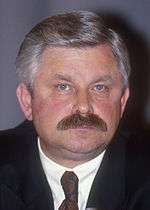 |
Alexander Rutskoy Александр Руцкой Born 1947 (age 72) |
Non-partisan | 22 September 1993 | 4 October 1993 | Vice President | Been acting president, during the 1993 constitutional crisis. His powers were not recognized by Boris Yeltsin. | |
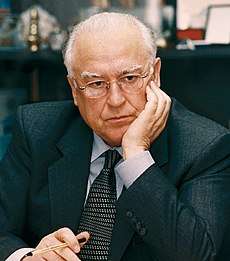 |
Viktor Chernomyrdin Виктор Черномырдин 1938–2010 (aged 72) |
Our Home – Russia | 5 November 1996 | 6 November 1996 | Prime Minister | Acting President during Boris Yeltsin's heart surgery. | |
 |
Vladimir Putin Владимир Путин Born 1952 (age 67) |
Unity | 31 December 1999 | 7 May 2000 | Prime Minister | The acting president when Boris Yeltsin resigned early. | |
Subsequent public service
Two presidents held other high federal offices after leaving the presidency.
| President | Presidency | Subsequent service | |
|---|---|---|---|
| Vladimir Putin | 2 | 2000–2008 | Prime Minister (2008–2012) |
| 4th President (2012–present) | |||
| Dmitry Medvedev | 3 | 2008–2012 | Prime Minister (2012–2020) |
| Deputy Chairman of the Security Council (2020–present) | |||
Living former presidents
As of June 2020, there is only one living former de jure president and one former acting president. The most recent death of a former de jure president was that of Boris Yeltsin (1991–1999) on 23 April 2007, aged 76 and the most recent death of a former acting president was that of Viktor Chernomyrdin (1996) on 3 November 2010, aged 72. Mikhail Gorbachov, former President of the Soviet Union, is also living.
List by age
The youngest person to assume the presidency was Dmitri Medvedev, who succeeded to the office at the age of 42 years.
The oldest person to be elected to a first term was Boris Yeltsin, who became president at the age of 60 years. To date he is also the longest-lived president, dying at the age of 76.
Of currently living presidents, the oldest is technically Alexander Rutskoy (72 years old), who was formally acting president during the 1993 coup, but apart from Rutskoy the oldest is Vladimir Putin (67 years old). The youngest is Dmitry Medvedev (54 years old).
| No. | President | Born | Age at start or presidency
(first term) |
Age at end or presidency
(last term) |
Post-presidency timespan | Date of death | Life span |
|---|---|---|---|---|---|---|---|
| 1 | Boris Yeltsin | February 1, 1931 | 60 years 159 days | 68 years 333 days | 7 years 174 days | April 23, 2007 | 76 years 80 days |
| 2, 4 | Vladimir Putin | October 7, 1952 | 47 years 213 days | (incumbent) | 4 years | (living) | 67 years |
| 3 | Dmitry Medvedev | September 14, 1965 | 42 years 236 days | 46 years 236 days | 7 years | (living) | 54 year |
See also
Notes
- Served as President of the Russian Soviet Federative Socialist Republic de jure within the Soviet Union (but after state sovereignty and referendum) from 10 July 1991 – 25 December 1991 after which the office became President of Russia after renaming of country. There is no difference between these office names. 1st presidential term of Yeltsin started in July 1991 and ended in 1996.
- Putin de facto took this position on 31 December 1999, when he became Acting President after the resignation of Boris Yeltsin. Elected President on 26 March 2000, officially took office on 7 May 2000.
References
- "Transcripts of 'Insight' on CNN". CNN. 7 October 2002. Retrieved 17 July 2007.
- GDP of Russia from 1992 to 2007 International Monetary Fund Retrieved on 12 May 2008
- Fedyukin, Igor (4 May 2008). "Putin's Eight Years". Kommersant. Archived from the original on 4 March 2016. Retrieved 4 May 2008.
- Putin visions new development plans for Russia China View Retrieved on 8 May 2008 Archived 1 February 2017 at the Wayback Machine
- Sergey Morozov, "Putin's Diplomacy: Russian Judo on World Tatami". – Saint Petersburg, publishing house "Krylov", 2008. – 288 pp. ISBN 978-5-9717-0630-4. Chapter "Dracula, Rotten Meat and Dr. Evil", p. 130: "... in the Kremlin they thought that Russia has become a subject of a series of political propaganda attacks orchestrated by the West and exiled oligarchs.", p. 139, Dmitry Peskov: "Things we observe in the British media relate more to a usual human hysteria rather than to journalism... President regards this calmly, understanding at the same time that this has nothing to do with journalism and analytics."
- Putin sees Medvedev as successor BBC News
External links
- Central Bank of Russia
- Energy Statistics for Russia – From the Energy Information Administration
- Federative Council—Official site of the parliamentary upper house
- Russian News Agency Ria Novosti
.jpg)
